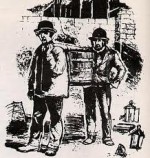 Can Food Be Too Local?
While shooting your own dinner is the sine qua non of localness, you should be allowed to draw the line. At Kelmscott Farm, I raised farm animals that met their death for the sake of high-end restaurants. This past weekend, I was shooting birds for sport, and yes, for food. But pulling the trigger put my meal just too close for comfort.
I joined a group of women who, judging from their gun bags and hunting attire, were experienced hunters. I, on the other hand, arrived Read more [...]
Can Food Be Too Local?
While shooting your own dinner is the sine qua non of localness, you should be allowed to draw the line. At Kelmscott Farm, I raised farm animals that met their death for the sake of high-end restaurants. This past weekend, I was shooting birds for sport, and yes, for food. But pulling the trigger put my meal just too close for comfort.
I joined a group of women who, judging from their gun bags and hunting attire, were experienced hunters. I, on the other hand, arrived Read more [...] Can Food Be Too Local?
1
 Can Food Be Too Local?
While shooting your own dinner is the sine qua non of localness, you should be allowed to draw the line. At Kelmscott Farm, I raised farm animals that met their death for the sake of high-end restaurants. This past weekend, I was shooting birds for sport, and yes, for food. But pulling the trigger put my meal just too close for comfort.
I joined a group of women who, judging from their gun bags and hunting attire, were experienced hunters. I, on the other hand, arrived Read more [...]
Can Food Be Too Local?
While shooting your own dinner is the sine qua non of localness, you should be allowed to draw the line. At Kelmscott Farm, I raised farm animals that met their death for the sake of high-end restaurants. This past weekend, I was shooting birds for sport, and yes, for food. But pulling the trigger put my meal just too close for comfort.
I joined a group of women who, judging from their gun bags and hunting attire, were experienced hunters. I, on the other hand, arrived Read more [...]  OK, it's just a knish, but a recent factory fire in New York put the kibosh on knishes. While the loss of knish production, 15 million a year from this one factory, is a raw deal for a food producer, the interruption in the knish supply chain illustrates how events such as a factory fire impact our food system.
The factory owners say that they will be making their famous square Coney Island knishes again by Thanksgiving. They will now be in the thick of adaptations that will stress every aspect
OK, it's just a knish, but a recent factory fire in New York put the kibosh on knishes. While the loss of knish production, 15 million a year from this one factory, is a raw deal for a food producer, the interruption in the knish supply chain illustrates how events such as a factory fire impact our food system.
The factory owners say that they will be making their famous square Coney Island knishes again by Thanksgiving. They will now be in the thick of adaptations that will stress every aspect  Trust matters. As we study what makes our food system work, we find that enduring human relationships are the sinews that flex when the system is disrupted. Social media may be our new tool for building relationships, but speed may not replace our old, slow method of building trust.
Transactions based on trust make the food world go 'round. Food producers, processors, and distributors depend upon relationships built over time that result in trusted transactions and confidence in credit, quality,
Trust matters. As we study what makes our food system work, we find that enduring human relationships are the sinews that flex when the system is disrupted. Social media may be our new tool for building relationships, but speed may not replace our old, slow method of building trust.
Transactions based on trust make the food world go 'round. Food producers, processors, and distributors depend upon relationships built over time that result in trusted transactions and confidence in credit, quality,  The Radio Lab recently featured a podcast called "Poop Train." Guaranteed to grab your attention, the title referred to a system used by cities to eliminate human waste water. Surprisingly, we learn from the podcast that it wasn't until the 1980s that New York City stopped dumping treated human waste into the ocean. Gradually, the treatment facilities improved and the resulting sludge was transported to farmers around the U.S. to dress their fields. Because the costs were so high to transport the
The Radio Lab recently featured a podcast called "Poop Train." Guaranteed to grab your attention, the title referred to a system used by cities to eliminate human waste water. Surprisingly, we learn from the podcast that it wasn't until the 1980s that New York City stopped dumping treated human waste into the ocean. Gradually, the treatment facilities improved and the resulting sludge was transported to farmers around the U.S. to dress their fields. Because the costs were so high to transport the  At a recent gathering in downtown Austin, the breakfast fare said it all. Organic yogurt, locally produced honey, fresh breakfast tacos broke from the usual offerings of croissants and Danish pastries. This crowd was invested in their food, mostly emotionally, some economically, as farmers, chefs, city planners, food activists, non-profits, and individuals gathered to learn about the possibility of a public food market in Austin.
Austin has farmers markets but no public market, yet. And even the
At a recent gathering in downtown Austin, the breakfast fare said it all. Organic yogurt, locally produced honey, fresh breakfast tacos broke from the usual offerings of croissants and Danish pastries. This crowd was invested in their food, mostly emotionally, some economically, as farmers, chefs, city planners, food activists, non-profits, and individuals gathered to learn about the possibility of a public food market in Austin.
Austin has farmers markets but no public market, yet. And even the